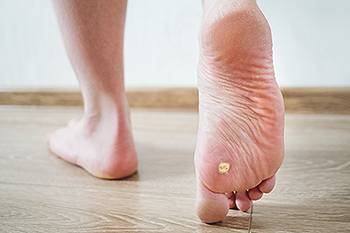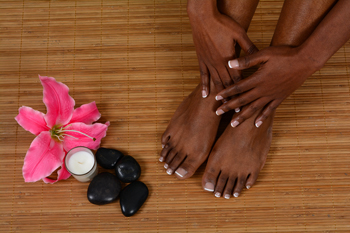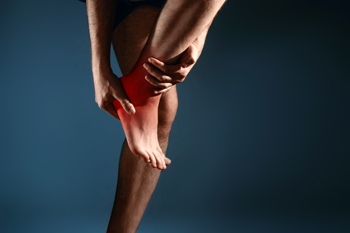Items filtered by date: June 2022
Dealing With Plantar Warts

If you notice a flat hardened callus on the bottom of your foot with tiny black spots showing beneath the skin, you may have a plantar wart. The area might be tender, but try not to touch it. This growth may be caused by the human papillomavirus (HPV), which is highly contagious and can enter your body through cuts or sores. The most common places to come into contact with HPV are swimming pools, locker rooms, and bathroom floors, all areas in which you are more likely to walk barefooted. Generally speaking, plantar warts are not dangerous, but they do spread rapidly. The most effective preventative method is to wear foot coverings in places where the virus thrives. If plantar warts become a common occurrence, refuse to go away on their own, or inhibit your ability to walk, it is a good idea to visit a podiatrist for guidance and a range of treatment options.
Plantar warts can be very uncomfortable. If you need your feet checked, contact Dr. Odin De Los Reyes from Connecticut. Our doctor will assist you with all of your foot and ankle needs.
About Plantar Warts
Plantar warts are the result of HPV, or human papillomavirus, getting into open wounds on the feet. They are mostly found on the heels or balls of the feet.
While plantar warts are generally harmless, those experiencing excessive pain or those suffering from diabetes or a compromised immune system require immediate medical care. Plantar warts are easily diagnosed, usually through scraping off a bit of rough skin or by getting a biopsy.
Symptoms
- Lesions on the bottom of your feet, usually rough and grainy
- Hard or thick callused spots
- Wart seeds, which are small clotted blood vessels that look like little black spots
- Pain, discomfort, or tenderness of your feet when walking or standing
Treatment
- Freezing
- Electric tool removal
- Laser Treatment
- Topical Creams (prescription only)
- Over-the-counter medications
To help prevent developing plantar warts, avoid walking barefoot over abrasive surfaces that can cause cuts or wounds for HPV to get into. Avoiding direct contact with other warts, as well as not picking or rubbing existing warts, can help prevent the further spread of plantar warts. However, if you think you have developed plantar warts, speak to your podiatrist. He or she can diagnose the warts on your feet and recommend the appropriate treatment options.
If you have any questions please feel free to contact our offices located in Southbury and Farmington, CT . We offer the newest diagnostic and treatment technologies for all your foot and ankle needs.
Keeping Your Feet Soft and Healthy

Most of us take our feet for granted, even though they are the most overworked and overburdened parts of our body. Given how important our feet are in having a healthy, full life, it stands to reason that we should practice proper foot health care. Neglecting to do so leaves us open to various foot ailments that can make walking hard and restrict our overall mobility. There are several things you can do to care for your feet. To start with, frequently examine your feet for any abnormalities. Wash your feet daily to rid them of dirt and sweat. Make sure to dry the feet thoroughly. Exfoliate them regularly to rid them of thick, hardened skin that tends to develop on weight-bearing and high-friction areas. Moisturize the feet to keep them soft and hydrated, making them less prone to cracked heels. Wear well-fitted shoes that provide adequate support to allow for ease of movement as well as to help prevent foot pain and injuries. Trim your toenails along the curve, without cutting them too short to ward against ingrown toenails. Soak the feet and massage them to relax, bring down any swelling, and help you calm and unwind after a long day. If you have an underlying health condition or find you are developing problems like corns, calluses, blisters, or infections, see a podiatrist for proper diagnosis and treatment.
Everyday foot care is very important to prevent infection and other foot ailments. If you need your feet checked, contact Dr. Odin De Los Reyes from Connecticut. Our doctor can provide the care you need to keep you pain-free and on your feet.
Everyday Foot Care
Often, people take care of their bodies, face and hair more so than they do for their feet. But the feet are a very important aspect of our bodies, and one that we should pay more attention to. Without our feet, we would not be able to perform most daily tasks.
It is best to check your feet regularly to make sure there are no new bruises or cuts that you may not have noticed before. For dry feet, moisturizer can easily be a remedy and can be applied as often as necessary to the affected areas. Wearing shoes that fit well can also help you maintain good foot health, as well as making it easier to walk and do daily activities without the stress or pain of ill-fitting shoes, high heels, or even flip flops. Wearing clean socks with closed shoes is important to ensure that sweat and bacteria do not accumulate within the shoe. Clean socks help to prevent Athlete’s foot, fungi problems, bad odors, and can absorb sweat.
If you have any questions please feel free to contact our offices located in Southbury and Farmington, CT . We offer the newest diagnostic and treatment technologies for all your foot and ankle needs.
Do Your Child's Feet Hurt?
Several Reasons Why Foot Pain Can Occur

There are 26 bones, several tendons, and ligaments that each foot is composed of. Many people worldwide will experience foot pain at least once during their lifetime. There are many causes of foot pain. It can be related to diabetes, inflammation, or wearing shoes that do not fit correctly. An uncomfortable foot condition known as athlete’s foot can cause itching and redness. A bunion is defined as a bony lump that forms on the side of the big toe. It can be bothersome while wearing shoes and many patients need to purchase larger shoes and socks. Bunions can develop due to genetic reasons or from wearing shoes that do not have adequate room for the toes to move freely in. Patients with an ingrown toenail are often familiar with the pain and discomfort this ailment can cause. In severe cases, there might be a discharge, which may be indicative of an infection. Heel pain that is worse in the morning is usually linked to a condition called plantar fasciitis. If you have any foot pain and would like a proper diagnosis and to begin an effective treatment plan, please schedule an appointment with a podiatrist.
Foot Pain
Foot pain can be extremely painful and debilitating. If you have a foot pain, consult with Dr. Odin De Los Reyes from Connecticut. Our doctor will assess your condition and provide you with quality foot and ankle treatment.
Causes
Foot pain is a very broad condition that could be caused by one or more ailments. The most common include:
- Bunions
- Hammertoes
- Plantar Fasciitis
- Bone Spurs
- Corns
- Tarsal Tunnel Syndrome
- Ingrown Toenails
- Arthritis (such as Gout, Rheumatoid, and Osteoarthritis)
- Flat Feet
- Injury (from stress fractures, broken toe, foot, ankle, Achilles tendon ruptures, and sprains)
- And more
Diagnosis
To figure out the cause of foot pain, podiatrists utilize several different methods. This can range from simple visual inspections and sensation tests to X-rays and MRI scans. Prior medical history, family medical history, and any recent physical traumatic events will all be taken into consideration for a proper diagnosis.
Treatment
Treatment depends upon the cause of the foot pain. Whether it is resting, staying off the foot, or having surgery; podiatrists have a number of treatment options available for foot pain.
If you have any questions, please feel free to contact our offices located in Southbury and Farmington, CT . We offer the newest diagnostic and treatment technologies for all your foot care needs.
Facts About Foot Drop

If you have trouble flexing or lifting your foot when you walk, you may have a condition known as foot drop. Symptoms include numbness, difficulty walking, or feet and toes that slap the ground when you walk. Foot drop is caused by a pinched nerve and may result from crossing your legs while sitting or wearing a tight bandage, brace, or cast. Foot drop can increase your risk of falling and may cause changes in your gait as well. You may start to march rather than walk as a way of lifting the toes that would otherwise drag behind. Foot drop can be permanent and calls for wearing an ankle brace to hold your foot in position. If you are experiencing symptoms of foot drop, it is suggested that you see a podiatrist who can perform specific tests to determine the severity and prescribe appropriate treatment regimens.
If you have any concerns about your feet, contact Dr. Odin De Los Reyes from Connecticut. Our doctor can provide the care you need to keep you pain-free and on your feet.
Biomechanics in Podiatry
Podiatric biomechanics is a particular sector of specialty podiatry with licensed practitioners who are trained to diagnose and treat conditions affecting the foot, ankle and lower leg. Biomechanics deals with the forces that act against the body, causing an interference with the biological structures. It focuses on the movement of the ankle, the foot and the forces that interact with them.
A History of Biomechanics
- Biomechanics dates back to the BC era in Egypt where evidence of professional foot care has been recorded.
- In 1974, biomechanics gained a higher profile from the studies of Merton Root, who claimed that by changing or controlling the forces between the ankle and the foot, corrections or conditions could be implemented to gain strength and coordination in the area.
Modern technological improvements are based on past theories and therapeutic processes that provide a better understanding of podiatric concepts for biomechanics. Computers can provide accurate information about the forces and patterns of the feet and lower legs.
Understanding biomechanics of the feet can help improve and eliminate pain, stopping further stress to the foot.
If you have any questions please feel free to contact our offices located in Southbury and Farmington, CT . We offer the newest diagnostic and treatment technologies for all your foot and ankle needs.

